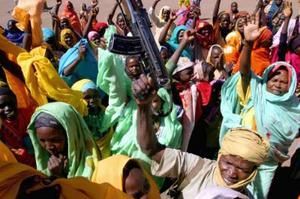Rebels commit themselves to work together for peace in Darfur
January 29, 2011 (KHARTOUM) — The Justice and Equality Movement (JEM) and the Liberation and Justice Movement (LJM) will meet next week for the first time in Doha to show their commitment to the peace process and discuss ways to coordinate their action.

“We, the undersigned agree to meet in Doha by the 5th day of February 2011, to demonstrate a common commitment to peace and justice for our region and our country,” says a joint communiqué signed by JEM and LJM leaders respectively Khalil Ibrahim and Tigani El-Sissi released on Saturday 29 January.
The two rebel leaders further called on the Sudanese government to resume immediately peace talks in Doha “for the purpose of reaching a comprehensive political solution to the conflict and an end to the suffering of our people”.
The Sudanese government withdrew its negotiating delegation from Doha after a deadlock in the talks with the LJM rebels over the power sharing file particularly Darfur status and the post of vice-president demanded by the rebels.
The government also said JEM was not serious to reach peace despite the presence of a delegation from the rebel group in Doha and the start of talks for a cessation of hostilities deal with the government negotiating team.
Khartoum announced the launch of an internal process to end the conflict involving tribal leaders, civil society groups, displaced persons, governors and elected institutions in the region. The process is also coupled with another initiative supported by the Sudanese government led by the former South African president turned peace broker, Thabo Mbeki.
The two rebel groups reiterated their rejection to the two processes.
“Any attempt to move negotiations inside Sudan will necessarily give the Government of Sudan control over the process. This “Khartoumization” of the process is unacceptable to us and represents an unconscionable move to grant the perpetrators of genocide and crimes against humanity control over their victims.
The rapprochement between the two groups is seen as a good boost to the efforts led by the mediators in Doha who worked tirelessly to achieve progress in the talks despite intrinsic and extrinsic hindrances related to the political situation in Sudan.
Darfur peace mediator, Djibril Bassole, welcomed” wholeheartedly” the common commitment of the two rebel groups to the Doha process terming it as “an unprecedented agreement to stand together on issues”.
“This breakthrough gives all of those who have been committed to Darfur in recent years a new reason to hope that a just and sustainable peace can be reached,” he said in a statement released Saturday.
Bassole urged the Sudanese government “to respond positively and engage those with a clear commitment to the Doha Peace Process” to reach a comprehensive and inclusive peace agreement.
He also called on two rebel movements, JEM and LJM, to develop this step and to work together towards a joint platform for the peace process.
The Sudan Liberation Movement led by Abdel Wahid Al-Nur is not part of the joint declaration. The group said recently holding consultations with the political forces, mass organizations and IDPs before to join the process.
“This is an important and sincere step towards the unification of the resistance in Darfur, I call upon all comrades and movements, to join this Declaration. This is not an exclusive declaration, it is meant however, to be an open and an inclusive one,” said JEM spokesperson Ahmed Hussein Adam.
“Our alliance is for peace if there is peace, otherwise we will continue defending our people collectively,” he said.
Tadjadine Bechir Niam, LJM top negotiator said this declaration intends to establish the foundation for common ground during the peace talks between the rebel groups. He also said this step shows their determination to negotiate a just peace agreement and defend the rights of Darfur people.
Niam stressed that their priority remains to stop the suffering of civilians in Darfur, adding that any national agenda can be considered after the settlement of the conflict.
Divisions among Darfurians are seen as one of the major obstacle to end the eight year conflict in the troubled region. The Sudanese government said rebels denatured the conflict seeking to implement other political agendas.
Since the failure of Abuja peace talks, the rebels said Khartoum is not poised to make the necessary concessions for a lasting peace. The rebel demands for a special regional status and a vice president position are the most disputed issues since Abuja talks in 2004-2006.
(ST)

Deng E. Manyuon
Rebels commit themselves to work together for peace in Darfur
It is a positive inititive. However, there is a need for re-unification of JEM, LJM and SLM in order to have a viable and lasting peace in that region.
Deng